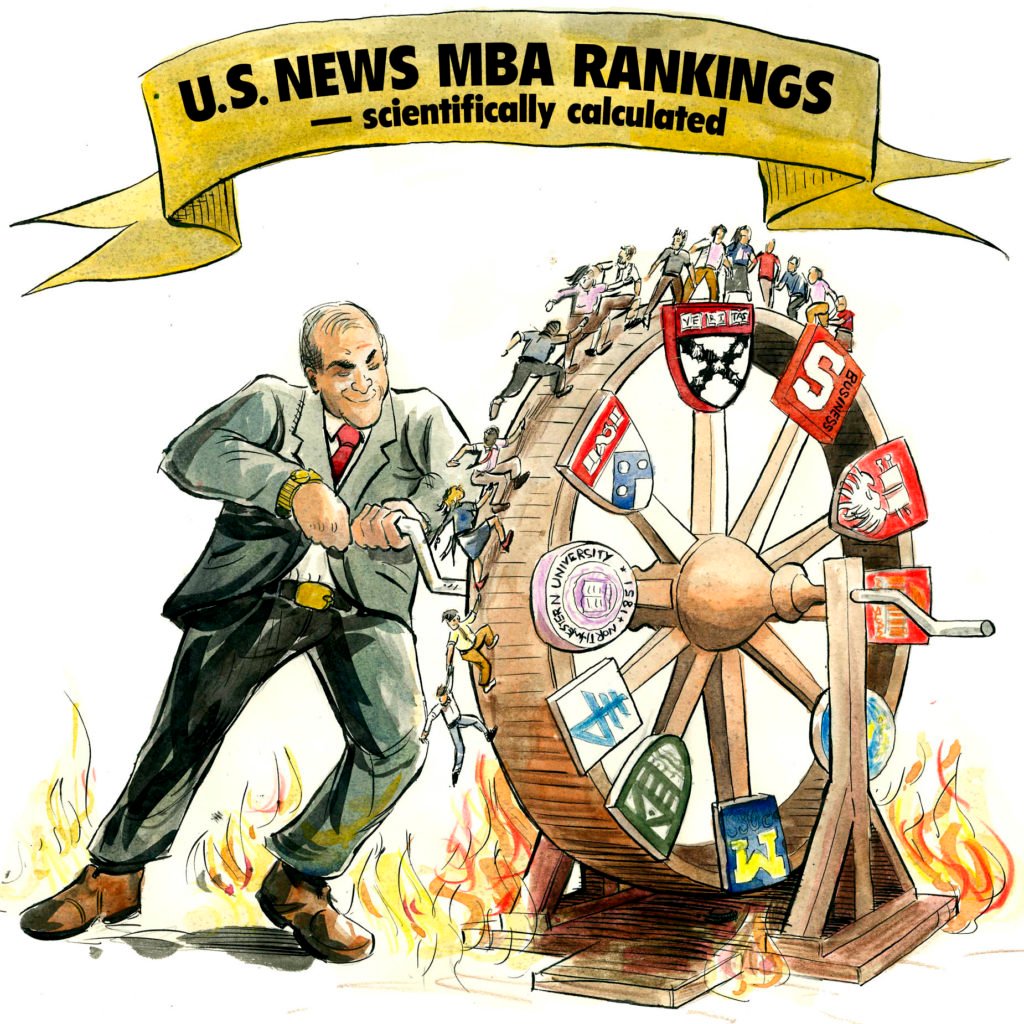MBA rankings come and go, but Harvard Business School is recognized as the long-term #1 business school in the world.
Stanford is famous for its ties to Silicon Valley, venture capital investing, and tech startups. But the Stanford Graduate School of Business is much broader than this, teaching students an interdisciplinary, interpersonal curriculum.
Menlo Coaching’s research team produces detailed industry reports on popular post-MBA career tracks, including management consulting and investment banking. Based on real student profiles, the data collected goes far beyond official employment reports to give you valuable insights into each MBA program’s job placement history in your target field.
Wharton is good in almost every area. Yes, finance, but also entrepreneurship, technology (don’t forget their San Francisco campus!), social impact, and more.
Kellogg School of Management at Northwestern University is rightly famous for its team-based approach and the location in Evanston, which combines access to Chicago with a relaxed college town setting.
The Booth program is known for its academic and analytical rigor, and the fact that its flexible curriculum has only a single strictly required course, with students customizing everything else.
Columbia is about access to New York City and its resources, like executives who come to campus as guest lecturers, entrepreneurs in residence, a large number of international students, and summer internships.
MIT Sloan is strong in technology — in all senses of the word. Tech at MIT doesn’t just mean Google, Facebook and Amazon, but also physical product design for consumers and industry.
Dartmouth College’s Tuck School of Business brings together a small number of students for an intense bonding experience in Hanover, NH, creating a fanatically loyal alumni group that donates to the business school at 2-3x the average, and pulls out all of the stops to help other Tuckies.
Berkeley’s Haas School of Business is on the forefront of diversity, both through its connection to the very progressive host university, UC Berkeley, and through its own initiatives, like appointing a Chief Diversity, Equity and Inclusion Officer. Its Bay Area location allows excellent placement within the tech industry.
UVA Darden, sometimes known affectionately as “the bootcamp,” puts students through a highly rigorous case method program (which makes the students very appealing to employers with a similar style, including banks and consulting firms).
Yale SOM seeks to educate “leaders for business and society,” with a special focus on training future managers about the impact of their decisions on society at large. Full time MBA students at the SOM also have access to the full resources of Yale University.
Duke University’s Fuqua School of Business focuses on admitting MBA students who have a high “decency quotient”, considering not just their professional achievements, but also whether they treat their colleagues, friends, classmates and others with respect.
The Ross business school is a part of the much larger University of Michigan, whose huge alumni footprint creates networking opportunities with people in almost any company or location, anywhere. “Go Blue, Go Anywhere!”
UT Austin’s McCombs School of Business is the “Harvard Business School of Texas,” and rather well respected outside the state, too. The Austin location provides great access to the city’s booming tech and VC scene.
Johnson’s host university, Cornell, has a fantastic reputation as part of the Ivy League, and getting your full time MBA at Cornell Johnson will allow you to experience Ithaca’s liberal New York state, college-town vibe to the fullest.
UCLA Anderson is the leading business school in Los Angeles, and it has excellent placement in the LA offices of McKinsey, BCG, and Bain, as well as top investment banks.
One of NYU Stern’s highlights is beyond doubt its downtown location in New York City — it even outshines Columbia in this regard. A major benefit of the NYC location for the Stern School of Business is its strong relationship with industries in the luxury retail sector.
Tepper’s host institution, Carnegie Mellon University, is one of the leading universities in the country for computer science and related fields such as automation, robotics, and artificial intelligence. If you’re interested in this space, Tepper’s full time program can provide you with the technical and analytical skills needed to succeed.
When referring to the best business schools in the US and worldwide, most people mean graduate business schools. However, there is a distinction between the best business schools at graduate level vs at undergraduate level.
There is a significant amount of overlap between the best business schools at undergraduate level and the best MBA programs, as can be seen at our directory of top undergraduate business schools.
Of the M7 MBA programs, the Wharton School at the University of Pennsylvania and MIT’s Sloan School of Business offer degrees in economics, finance, business administration, other business subjects which set up their graduates for success after university.
Outside of the M7, several more of the best business schools also stand out for the undergraduate offerings. NYU Stern, University of Michigan Ross School of Business, UC Berkeley Haas, Cornell University, and UT Austin McCombs similarly prime undergraduate business students for promising business careers. We also consider the undergraduate degrees offered by Carnegie Mellon’s and UVA’s respective business schools particularly attractive at undergraduate level.
Further, at graduate level, some of the best business schools offer alternatives to MBA programs. For instance, Kellogg’s Master in Management is highly respected. MIT’s, USC’s, and NYU’s business schools offer similar programs which teach many of the same skills that are taught in MBA programs. Other schools offer Master’s degrees in finance and economics, which—depending on the business school and a given student’s career goals—can be beneficial for certain students.
While these alternative graduate business school programs teach similar content to MBA programs, there are numerous benefits to pursuing an MBA program over an alternative graduate business program, including the caliber of the network you acquire, the recruitment opportunities, and the additional credibility afforded to MBA graduates. If you’re unsure of which program type would work best for you, considering reaching out to a business school admissions consultant.
As an MBA applicant, you might be tempted to rely solely on rankings of the best MBA programs when deciding between business schools. But that would be a mistake.
While some aspects of the various MBA program rankings can be useful in your initial research, you have to realize that rankings are mainly designed to benefit the organization that publishes the list, rather than you, the applicant. Further, most of the rankings are arbitrary nonsense, built on very, very shaky foundations.
As you might already be able to tell, we have mixed feelings about the overall usefulness of MBA rankings, and we want to be sure that they are consulted responsibly. So we have combed through the data, studied methodologies and underlying goals, and prepared breakdowns on the most popular listings that you are likely to encounter during your research, including global MBA rankings and rankings focused solely on US schools. You can read about our general findings on this page, with more links to focused pages below. We have also included some tips on how to choose a business school that is right for you—rankings be damned!
And if you want something that’s almost like a ranking, but a bit more applicant-focused, see our directory of top MBA programs, which doesn’t focus on a ranking formula, but on the curriculum, class profile, employment report and culture of each MBA program, with each business school profile page containing resources including video interviews with students and admissions staff.
You can read in-depth analysis of each major ranking on their individual pages:
Finally, you can read more about our MBA admissions consulting service to learn how we can help you create winning applications to the best business schools in the US.

MBA program rankings capture something real, in the sense that an HBS MBA commands more respect than a Columbia Business School MBA, which in turn is respected more than one from UCLA Anderson. If you are totally new to the MBA world, a ranking can quickly orient you on which business schools are considered most desirable by prospective MBA students and post-MBA employers.
The ranking also correlates strongly with the selectivity of those business schools and your chances of admission. You know that you’ll need a great profile in order to be a realistic candidate for top programs, since those programs attract large numbers of highly qualified applicants. So if you’re applying with a low GPA, low GMAT scores, and average work experience, you should not be targeting the very “best” business schools—or the programs at the very top of the rankings.
Beyond that? Once you generate a short list of target business schools, you should put the MBA rankings aside.
In general, there are some broad considerations that you should make when looking at rankings of the best MBA programs.
The easiest way for MBA programs to manipulate MBA rankings is to focus on raising their average GMAT scores and average undergraduate GPA. There are always candidates in the applicant pool who have great stats, but slightly weaker professional experience. Admitting a few more students with this profile can help business schools boost their rankings, with business schools hoping that they can “fake it until they make it” — after the ratings increase, and the increase in applications to the business school, they hope they can make things right by admitting students who have both great stats and great experiences.

Another way to manipulate rankings is to recruit students who obviously have high post-MBA earning potential. The most famous example of this was the Adam Allcock scandal, in which Stanford GSB awarded large financial aid packages to students with extremely high pre-MBA earnings, despite a stated policy that only need-based financial aid was available. The suspected motivation? Stanford wanted to give high-earning private equity professionals a reason to prefer Stanford over Harvard, therefore helping Stanford to show the highest post-MBA earnings of any school.
Strategies like these can influence rankings, but don’t make the MBA program more valuable to its students.
If you are having a miserable time during your two years, you will not get the full benefits of the degree—regardless of how it ranks among the best business schools. Don’t forget that a lot of the value of an MBA program is the network you build with your peers. It’s easier to build a strong network when you’re surrounded by people you admire and want to spend time with.
The ultimate purpose of MBA program rankings is to generate page views and advertising revenue for the organizations that publish them. For this purpose, it’s great if the rankings are controversial, with many business schools rising and falling each year so that everyone has to monitor the rankings obsessively for updates on the best business schools of that year.
But, factors that influence the value of an MBA program actually change very slowly. For example, it takes time for top business schools to recruit new faculty, build relationships with new post-MBA employers, and raise donations from alumni to support expanded resources for the students. This means that the value of a given MBA program changes slowly, with very, very few events actually justifying a dramatic change over a single year.
Once you determine roughly which business schools you are qualified to attend, we encourage you to focus on the practical questions that will help you figure out which are the best business schools or MBA programs for you, i.e. which programs are going to add value to your career. These are simple, practical questions:
Answering these questions will help you find the best MBA programs for you and your career.
Understanding the rankings of business schools is easier with the help of MBA consultants who can guide you through the school selection process.